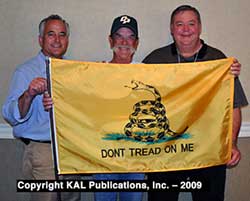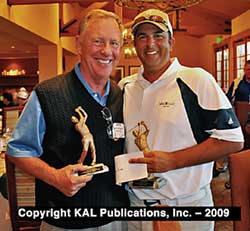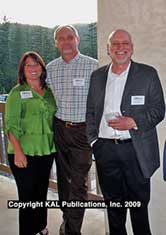

California Petroleum Conference

Northern California Petroleum Industry Golf and Tennis Invitational

Alliance Petroleum Annual Meeting
Want to see the photos that didn't make the issue? Check out the Cutting Room Floor.
Jack In the Box To Sell C-Stores
Topping Off Made Illegal In Oregon
Imperium Renewables Sells Seattle Biodiesel
Plant
BP Fined $1 Million For Clerical Errors
SAN DIEGO, CA. — Bringing the company's participation in the gasoline and convenience store market toward a close, Jack in the Box Inc. has signed a deal to sell 55 of its 61 Quick Stuff convenience stores and gasoline stations. The all-cash transaction, announced at the end of June, is expected to be completed by the close of the company's fiscal year ending September 27, 2009.
Jack in the Box said it is "currently in negotiations with several other bidders on the remaining Quick Stuff sites" and also expects to sell the remaining locations by the end of the current fiscal year.
The company does not intend to sell any of the Jack in the Box restaurants adjoining the Quick Stuff locations.
The purchase price of the deal was not disclosed. However, Jack in the Box said the sale of the Quick Stuff stores is expected to result in a charge, net of taxes, of approximately $10 to $14 million to the company's fiscal third quarter 2009 results.
Linda Lang, chairman and chief executive officer, said, "The Board and management of Jack in the Box agreed that by selling Quick Stuff, we can focus on maximizing the potential of our Jack in the Box and Qdoba¨ brands. We appreciate the dedication of all of our Quick Stuff employees, and will look to them to assist in a smooth transition during this process."
SALEM, OR. — A new regulation has made it illegal for Oregon gas station attendants to top off gas tanks.
Under the terms of a new Department of Environmental Quality law that went into effect on July 1, attendants are no longer allowed to top off the gasoline tank due to environmental concerns. The DEQ noted that topping off during fueling "can cause gasoline to spill and release benzene, a known carcinogen, and other toxic pollutants into the air."
"This is a health concern for gas station workers and drivers," stated the DEQ in an official notice. "In addition, most modern pumps simply return the fuel back into the pump after the overflow click which means drivers are paying for gas that does not get into the fuel tank."
DEQ added that in some cases overfilling a gas tank can cause a vehicle's vapor control system to clog and stop working, which could require "costly repairs" by motorists.
The Environmental Quality Commission, DEQ's rulemaking and policy advisory board, approved and adopted the no topping off regulations in December 2008.
The DEQ did not specify any punitive action that might be taken if an attendant was caught topping off a tank.
SEATTLE, WA. — Imperium Renewables has sold its biodiesel refinery here to General Biodiesel, a local company, effective as of the end of June. The purchase price was not disclosed.
Imperium had used the biodiesel refinery has a pilot plant when the company was launching production. The Seattle facility has a capacity of approximately five million gallons of biodiesel annually but had not been operated since Imperium's refinery in Grays Harbor, WA., came online in 2007.
The Grays Harbor refinery has a capacity of 100 million gallons of biodiesel annually. The company provides biodiesel throughout the Northwest as well as to the Hawaiian Electric Company in Kalaeloa Harbor, HI.
General Biodiesel officials say they will use restaurant grease and other local waste oils as feedstock for the Seattle refinery.
SACRAMENTO, CA. — BP West Coast Products has been fined more than $1 million by the California Air Resources Board, primarily for clerical errors.
CARB fined BP for 17 violations of the state's clean air regulations relating to fuels. However, most of the violations were clerical errors that led to inaccurate reporting to enforcement officials, even though the company was in compliance with the actual regulations.
While the mistakes did not lead to increased emissions, "the state depends on accurate accounting to ensure that more serious errors do not occur," said CARB in an official press release.
"The large fine reflects the number of smaller violations and the size of BP's role in California's energy market," said CARB Chairman Mary D. Nichols. "Seemingly small mistakes can have major consequences and accurate accounting is crucial to protecting public health."
BP's violations include misreporting the characteristics of fuel brought into the state, failures to appropriately report the shipping and unloading of fuel and shipping fuel to California that did not meet evaporative emission standards and shipping fuel that didn't match documentation.
Originally published in the August 2009 issue of O&A Marketing
News.
Copyright 2009 by KAL Publications Inc.
Serving the 13 Western States, the World's Largest Gasoline, Oil, Fuel, TBA and Automotive Service Market